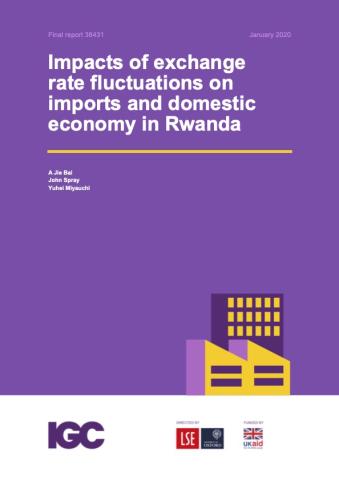Impacts of exchange rate fluctuations on imports and domestic economy in Rwanda
-
Bai et al final report January 2020_2.pdf
PDF document • 2.8 MB
In this project, we explore how exchange rate fluctuations affect firms’ import and domestic activities.
Our analysis takes advantage of the transaction-level Customs data and the newly available Electronic Billing Machines (EBM) data, which covers the universe of the firm-to-firm and firm-to-consumer transactions by VAT registered firms in Rwanda.
Using the Customs data, we find that exchange rate fluctuations significantly affect import prices, with an elasticity of 0.1 to 0.4 depending on the price measure used. Currency depreciation also reduces the quantity of imports. In terms of heterogeneity, small firms and firms importing intermediate goods appear to be affected more (i.e. experience higher pass-through). On the extensive margins, we document suggestive evidence that firms may reduce the number of products they import and the number of countries they source from in response to currency depreciation, and some degree of substitution may happen across the origin countries.
Using the EBM data, we find evidence of import substitution, i.e., importers increase domestic purchases in response to an increase in exchange rate. We also find limited pass-through of exchange rate shocks to domestic buyers of importers. There are no impacts of exchange rate fluctuations on domestic sales prices. This is partly because of the import substitution as indicated above. We find that large firms, and firms in commerce industries, are less affected by the exchange rate shocks. Lastly, we do not find significant impacts on the markups.
One important policy takeaway of this study is that we find limited pass-through to domestic prices. This happens both on the margin of import prices, as well as domestic sales prices charged by importers. In other words, a weaker Rwandan Franc is not necessarily leading to higher domestic prices that Rwandan consumers face.





